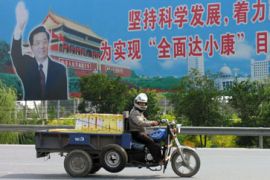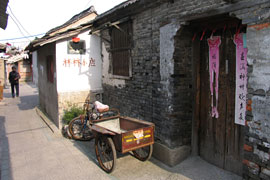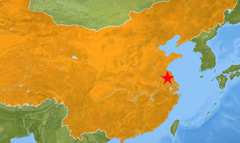Getting to know Hu
Chinese city does little to trumpet connections to its most famous son.

 |
|
Beyond a few generic propaganda banners, the city of Taizhou has |
As the Chinese president leads a landmark congress of the Communist party in Beijing this week, Al Jazeera travels to Hu Jintao’s childhood home and finds a city that, like its most famous son, prefers to shun the limelight.
|
Your Views |
“I think China will strongly embrace economical reform if promises made by its president go ahead”
Mohamed Hassan, Galkayo, Somalia |
Climbing up a shaky wooden ladder, 73-year-old Hu Juncai points to the other side of a high whitewashed wall at the old home of a former childhood playmate.
“There it is,” he says “You can just see it through the trees.”
Looking back almost 60 years he had no idea that his quiet, unassuming friend would go on to become the leader of an emerging superpower.
“Definitely, completely, I never thought about it,” he says.
That friend was Hu Jintao, general-secretary of the Chinese Communist party and president to one-fifth of the world’s population.
According to official Communist party accounts, China‘s president hails from the poor inland province of Anhui.
Anonymity
 |
| Largely hidden from view Hu Jintao’s family home shows signs of having been restored |
But as Hu Juncai – no relation to the president – and anyone else in the city of Taizhou will tell you, it is here that the man who would become president was born and brought up.
The former homes of other Chinese leaders, Mao Zedong, Deng Xiaoping and even Hu’s predecessor, Jiang Zemin, have all become museums – places of pilgrimage for the party faithful.
Here in Taizhou – an otherwise anonymous city in China‘s booming Yangtze delta – the traditional grey brick courtyard home where the young Hu grew up is now hidden away, unmarked, in the shadow of a new high-rise branch of a Chinese bank.
| Taizhou key facts |
|
GDP: Y70.5bn (2004) Major industries: Machinery, electrical and electronics, foodstuff, chemistry, textile, pharmaceutical and construction materials |
The humble neighbourhood where he grew up still stands, a warren of centuries-old alleys surrounded by gleaming new shopping malls.
That it has not been knocked down like thousands of similar neighbourhoods across China is perhaps the only indication of its lofty connections.
But while other world leaders might at least get an enamel sign marking the site of their ancestral homes, the only thing adorning the wall outside Hu’s former home is, rather incongruously, a condom vending machine.
Peering over the wall, the house itself shows signs of having been recently restored. Efforts to get a closer look are shooed away by uniformed bank security guards, but not before a sneaked photograph.
In fact, other than a few uplifting billboards emblazoned with Hu’s trademark call to “build a harmonious society” – the like of which is seen in countless other Chinese cities – the city of Taizhou does nothing to trumpet its connection to its most famous son.
“He’s not interested in adulation,” says Hu Juncai, pointing to the walls surrounding the old Hu family home.
‘Mild and calm’
 |
| Hu Jun Cai still lives in the neighbourhood where he once played with a young Hu Jintao |
“His family was very poor, so his uncle looked after him,” he recalls. “His whole life was very simple, even when he was a kid he didn’t like vanity.”
It seems the younger Hu Jintao was, perhaps, a bit of a geek, burying himself in books or playing sports but otherwise keeping to himself.
“He was a pretty mild boy, very calm,” recalls Hu Juncai. “He wasn’t a naughty child. Even when he was a kid he kept his promises – he said something and he meant it.”
Despite downplaying its biggest claim to fame, Taizhou seems to have done well from Hu’s rise to power.
On the outskirts of the city a huge new railway station has been built, rivalling many airports in scale.
Locals say the original blueprint had been much smaller, but the railway bureau beefed up the plans after they were reminded that this was the president’s hometown.
In the city itself, rows of neatly lined villas testify to the city’s growing middle class that is drawing a crowd of young entrepreneurs.
On the day Al Jazeera visited, 29-year-old Ying Ping had just opened her own business selling luggage and accessories.
“I am very proud that Hu Jintao came from Taizhou,” she says. “Everybody’s life here has improved under his leadership so it’s good for business.”
And among the new names on the business scene an old one is making a comeback.
In a quiet backstreet, local businessman Wang has restarted the old Hu family tea trading business; shutdown after Hu Jintao’s father was denounced and jailed during the Cultural Revolution.
The Hu brand
 |
|
The humble neighbourhood where Hu grew |
Wang bought the brand earlier this year for about $1,000 and has big plans to trade on the Hu name.
“Definitely this brand will help my business,” he tells us, “I’m sure the name will help it grow.”
Whether Wang’s venture has an official seal of approval though is unclear, and he is reluctant to talk about it.
Hu himself left Taizhou aged 18 after winning a place at Beijing‘s elite Tsinghua University, and the city probably carries unhappy memories for him.
In the years since he is only believed to have been back once, in his early days as a low-ranking party cadre in an effort to clear his father’s name.
At the time, the story goes, he arranged a banquet with local Communist party officials, but when the appointed time came nobody turned up.
 |
| Like many cities in the prosperous Yangtze delta, business is booming in Taizhou |
He was left sitting alone and has not been back since.
His silence on the issue since seems typical of a man known for playing his cards close to his chest.
Back in Hu’s old neighbourhood, Hu Juncai is happy to recall the old days but doubts he will ever see his former playmate return.
Almost six decades on, the gulf between the two friends is illustrated by the wall that now cuts off the president’s childhood home from his former neighbours.
“Now he’s the general-secretary, he has a lot of big government affairs to consider,” Hu Juncai says. “I’m only a small silversmith – how could I talk to him?”

